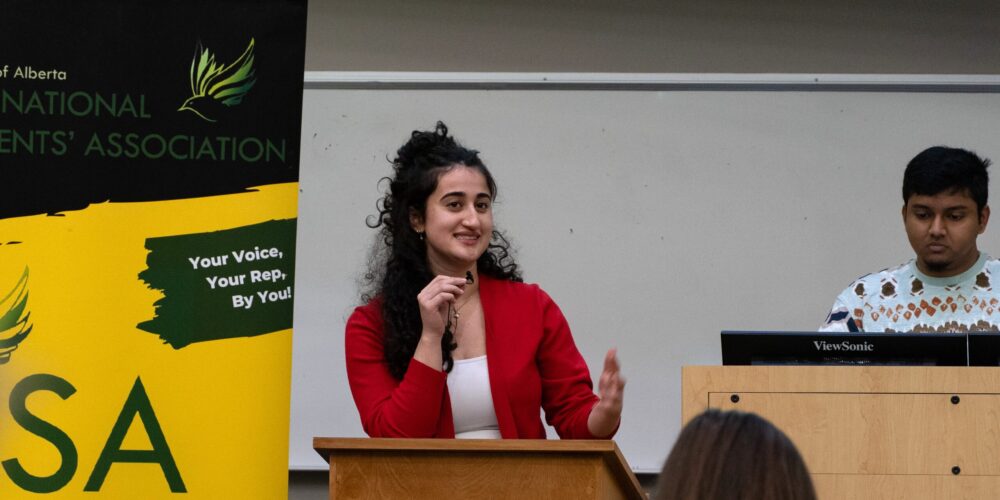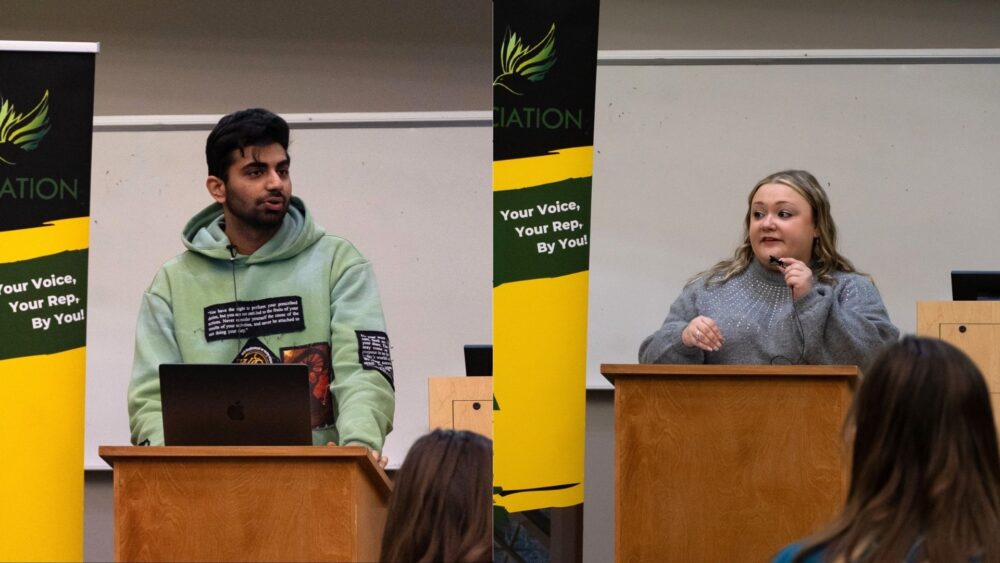 Supplied
SuppliedMy future was bleak.
I had dreams of an unlikely career in a fragile industry, where the precarious job security of college-educated employees is the norm. Every day, I would ask myself what the hell I got myself into.
And that was before Postmedia axed damn near every journalist in the province last week.
Bleak? Today, impossible is more like it.
The jobs I knew I would be vying for after graduation, the doors that I wanted to put my foot in, were now shut. In an effort to save upwards of $80 million by 2017, Postmedia chopped 90 journalists across Edmonton, Calgary, Vancouver and Ottawa, with Alberta seeing the most drastic cuts. Edmonton newspapers axed 35 journalists, and Calgary severed 25. Margo Goodhand, the former editor-in-chief of the Edmonton Journal, who was the only editor to publicly speak out against Postmedia, was fired on Jan. 19 along with her managing editor, Stephanie Coombs. Ryan Cormier, the premier court reporter in the city, and Brent Wittmeier, a young “do-it-all” who seemingly had a secure future with the Edmonton Journal, were also cut amongst many others. Seasoned journalists, who people like me looked up to as mentors and inspirations, are now our competitors in a tight job market.
We expected to see more layoffs as CBC is in the midst of a five-year plan where it plans to downsize by 1,500 jobs by 2020 as the company shifts to prioritize digital and mobile services. Bell Media cut 380 positions in Toronto and Montreal last November, while their main competitor Rogers Media announced 200 cuts in TV and radio earlier this week. The landscape of media is changing, and Alberta is simply a microcosm of these problems in the Western world.
Alberta is supposed to be the powerhouse of the country’s economy, yet national and international coverage of Alberta news is widely underreported. The Keystone XL pipeline garnered vast media attention, as President of the United States Barack Obama called Alberta’s money “dirty,” which flooded headlines and painted a crude picture of Albertans and their precious oil. But who else is going to cover the alarming 30 per cent increase in suicide rates in Fort McMurray amid the oil crisis? The Globe and Mail and even The New York Times have sent reporters up to Fort McMurray for a couple stories on the pipeline, but only Alberta media can truly call it their beat.
National media outlets, such as The Canadian Press, who do have (very small) bureaus in Alberta, looked to the in-depth reporting contextual knowledge of the Edmonton Journal and Calgary Herald to supplement and inform their coverage of Alberta news. The shocking number of children who died while in government of Alberta foster care wasn’t a national story until The Fatal Care series, expertly tag-teamed by the Journal’s Karen Kleiss and the Herald’s Darcy Henton, was published.
Nobody else is more qualified and capable to accurately report and keep governments and politicians, such as the Notley NDP government, in check and accountable for their actions.
Now, after Postmedia dismissed those unlucky journalists in Edmonton and Calgary, the risk of deficient coverage in Alberta is growing, and the medium for strong and thorough news reporting is shrinking. The dialogue surrounding Alberta news has been parsed so severely as a result of Postmedia’s attempt to bandage the bleeding wound of declining print ad revenue and newspaper subscriptions. Now, the onus is put on the remaining few journalists, who type and research away in small undermanned newsrooms to provide that coverage and commentary in Alberta media.
Perhaps, no voice is bigger than the Edmonton Journal’s Paula Simons.
“I’m more worried we’re not going to be able to do the investigative work that we’ve done in the past,” Simons said to me, just after she told a room full of aspiring student-journalists (including myself) what the dim future of newspapers looks like. “That big, deep, investigative journalism is going to be much harder than it used to be. That’s the stuff that matters.”
And even if those longer, informative investigative pieces (that can take longer than a year to complete) continue to be written, daily news will be underreported simply due to lack of manpower.
After the Sun and Journal newsrooms were merged and subsequently cleaned out, the Edmonton sports desk was left with just two full-time staff. Because of the scarcity of jobs, journalism is cutthroat and ruthlessly competitive. I thought about the freelancing opportunities I would have in the sports section, now that they are seriously — and potentially fatally — undermanned. But I grew sick thinking of my benefit coming at the misfortune of Journal vets Joanne Ireland, Norm Cowley and John MacKinnon.
While my colleagues and circle of journo-buddies are outraged, part of the problem is that Albertans might not see this as a problem. “What’s the problem?” they may ask. “We have Twitter and aggregated news sites, plus a newspaper still comes out tomorrow.”
“As long as we keep maintaining this facade that everything is going to be alright, everyone is going to say, yeah well, everyone is getting laid off (such as engineers and oil industry workers) in Alberta,” Simons told me.
That may be true, but who’s going to report on those layoffs when they happen?
Somebody has to. But at the rate Alberta is headed now, chances are it won’t be us.





Good piece. As a former newspaper editor/reporter who toiled around weeklies and small dailies for about 12 years, I can tell you that news of the layoffs last month was chilling. Some of my former co-workers (including a former roommate), people who moved on to the Journal and the Sun, were among the cuts. I was glad to be a working journalist for as long as I was … but I’m also glad I got out when I did. Sad to say, but it’s true.
What many people who aren’t in the media (or newspaper) business fail to grasp is the problem faced by traditional media isn’t a content issue, it’s a revenue-generation issue on the advertising side.
Newspapers aren’t dying because print-reporters are getting outgunned or beaten to stories by bloggers and other forms of “new media.” Rather, newspapers are dying because no one in the business has figured out a way to make the same kind of money off the Internet as they did with good-old-fashioned print advertising.
But no one should ever think that it’s the fault of working journalists or the content they’re delivering, either on printed paper, on the airwaves or via HTML coding. Journalists have been, and always will be, the best developers of content in the media.
My advice to you? Head on out to the weeklies, my friend. I realize that the work’s not as glamourous and the pay isn’t quite as good but, in many communities, weeklies have a monopoly on content and are very measured with what they put online and don’t put online. Because of that, they can, to some extent, drive people to the printed product and still make money off of the display ads. St. Albert has an excellent weekly – I’d highly recommend it.
From there, find a small daily (again, try to find one in a one-newspaper town) and hunker down and build up your portfolio for a couple of years. In 3-5 years’ time, you still might be able to find your way to the Edmonton Journal or Calgary Herald or, failing that, the Winnipeg Free Press, one of the Saskatchewan dailies or even the Red Deer Advocate. There are still plenty of viable operations out there, even if it seems like none of them are operating in Edmonton or Calgary.
Newspapers have always been a young-person’s game and to play it the right way, you have to earn your way up. I’m out of the business now but I’m still convinced it’s that way. Don’t quit on it just yet and don’t despair just because doors seem to be closing in Edmonton and Calgary.
I second that recommendation for the weeklies. They too might not hang on forever, but they’re sure hanging in there comparatively for now. I’ve seen several people get a start in them, and they love the experience enough to not even want to leave. Some of them are smaller operations for communities smaller than campus newspapers, so you already know you’ve got what it takes. There’s less glamour, but you’re in the game because you care about people, not glamour, yeah?